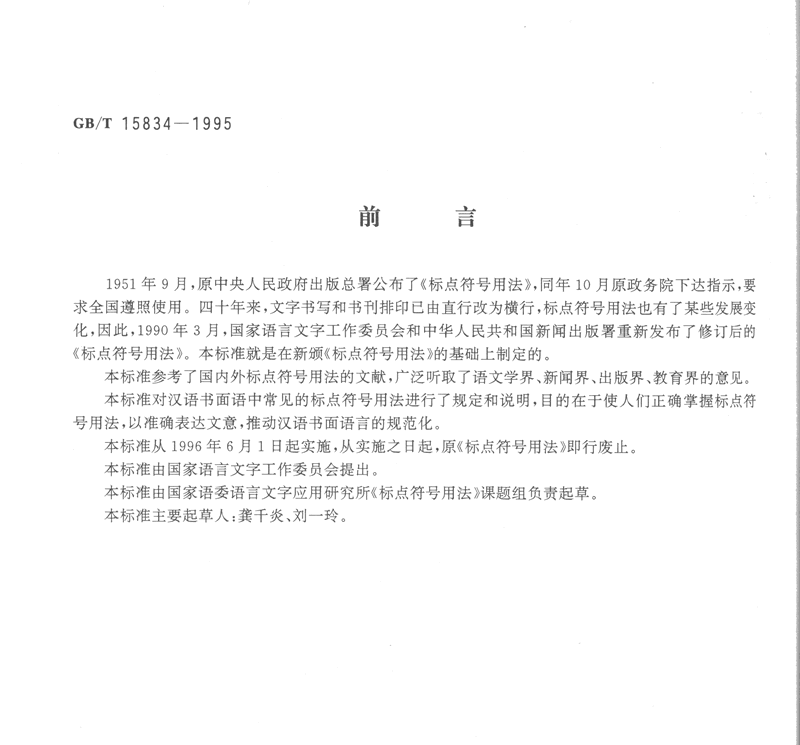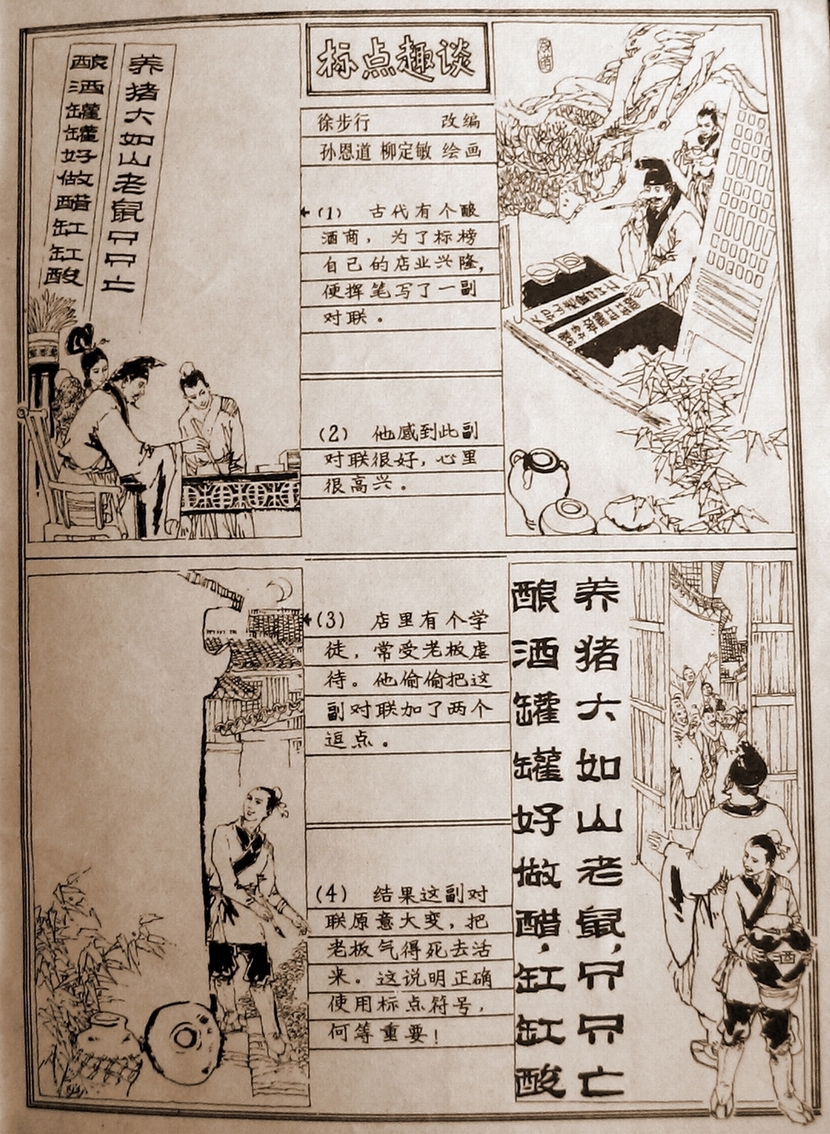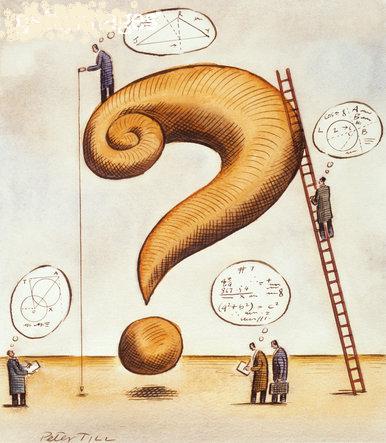基本介紹
定義
 嘆號
嘆號種類
| 標準名稱 | 別稱/非正式名稱 | 符號形式 | 符號形式 | |
|---|---|---|---|---|
大陸 | 台灣 | 大陸 | 大陸 | 台灣 |
句號 | 句點 | 。 | ||
? | ||||
驚嘆號、感嘆號 | 驚嘆號、感嘆號 | ! | ||
讀(dòu)號、逗點 | , | |||
、 | ||||
分號 | ; | |||
: | ||||
“” ‘’ | ||||
直角引號 | 「」『』 | |||
() | ||||
[] | ||||
〔〕 | ||||
方頭括弧 | 【】 | |||
—— | ||||
刪節號 | 刪節號 | …… | ||
一字線 | — | |||
短橫線 | - | |||
浪紋線 | ~ | |||
· | ||||
- | 《》〈〉 | |||
書名號 | 浪線書名號 | ﹏﹏ | ||
___ | ||||
- | . | |||
用法
| 名稱 | 符號 | 用法說明 | 舉例 |
|---|---|---|---|
句號① | 。 | 1.用於陳述句的末尾。 | 北京是中華人民共和國的首都。 |
2.用於語氣舒緩的祈使句末尾。 | 請您稍等一下。 | ||
問號 | ? | 1.用於疑問句的末尾。 | 他叫什麼名字? |
2.用於反問句的末尾。 | 難道你不了解我嗎? | ||
嘆號 | ! | 1.用於感嘆句的末尾。 | 為祖國的繁榮昌盛而奮鬥! |
2.用於語氣強烈的祈使句末尾。 | 停止射擊! | ||
3.用於語氣強烈的反問句末尾。 | 我哪裡比得上他呀! | ||
逗號 | , | 1.句子內部主語與謂語之間如需停頓,用逗號。 | 我們看得見的星星,絕大多數是恆星。 |
2.句子內部動詞與賓語之間如需停頓,用逗號。 | 應該看到,科學需要一個人貢獻出畢生的精力。 | ||
3.句子內部狀語後邊如需停頓,用逗號。 | 對於這個城市,他並不覺得陌生。 | ||
4.複句內各分句之間的停頓,除了有時要用分號外,都要用逗號。 | 據說蘇州園林有一百多處,我到過的不過十多處。 | ||
頓號 | 、 | 用於句子內部並列詞語之間的停頓。 | 正方形是四邊相等、四角均為直角的四邊形。 |
分號② | ; | 1.用於複句內部並列分句之間的停頓。 | 語言,人們用來抒情達意;文字,人們用來記言記事。 |
2.用於分行列舉的各項之間。 | 中華人民共和國行政區域劃分如下: 1、全國分為省、自治區、直轄市;2、省、自治區分為自治州、縣、自治縣、市; 3、縣、自治縣分為鄉、民族鄉、鎮。 | ||
冒號 | : | 1.用於稱呼語後邊,表示提起下文。 | 同志們,朋友們:開會了…… |
2.用於“說、想、是、證明、宣布、指出、透露、例如、如下”等詞語後邊,提起下文。 | 他十分驚訝地說:“啊,原來是你!” | ||
3.用於總說性話語的後邊,表示引起下文的分說。 | 北京紫禁城有四座城門:午門、神武門、東華門、西華門。 | ||
4.用於需要解釋的詞語後邊,表示引出解釋或說明。 | 外文圖書展銷會 日期:10月20日至於11月10日 時間:上午8時至下午4時 地點:北京朝陽區工體東路16號 主辦單位:中國圖書進出口總公司 | ||
5.用於總括性話語的前邊,以總結上文。 | 張華考上了北京大學;李萍進了中等技術學校;我在百貨公司當售貨員:我們都有光明的前途。 | ||
引號③ | “” ‘ ’ | 1.用於行文中直接引用的部分。 | “滿招損,謙受益”這句格言,流傳到今天至少有兩千年了。 |
2.用於需要著重論述的對象。 | “書皮”改成“包書紙”更確切,因為書皮可以認為是書的封面。 | ||
3.用於具有特殊含義的詞語。 | 這樣的“聰明人”還是少一點好。 | ||
4.引號裡面還要用引號時,外面一層用雙引號,裡面一層用單引號。 | 他站起來問:“老師,‘有條不紊’是什麼意思?” | ||
括弧④ | () | 用於行文中注釋的部分。注釋句子中某些詞語的(句內括弧),括注緊貼在被注釋詞語之後;注釋整個句子的(句外括弧),括注放在句末標點之後。句內括弧內部可以有有逗號或分號,但不能有句號,即使是一個完整的句子,也不能點句號。 | (1)中國猿人(全名為“中國猿人北京種”,或簡稱“北京人”)在我國的發現,是對古人類學的一個重大貢獻。 (2)寫研究性文章跟文學創作不同,不能攤開稿紙搞“即興”。(其實文學創作也要有素養才能有“即興”) |
破折號 | ── | 1.用於行文中解釋說明的部分。 | 邁進金黃色的大門,穿過寬敞的風門廳和衣帽廳,就到了大會堂建築的樞紐部分──中央大廳。 |
2.用於話題突然轉變。 | “今天好熱啊!──你什麼時候去上海?”張強對剛剛進門的小王說。 | ||
3.用於聲音延長的擬聲詞後面。 | “嗚──”火車開動了。 | ||
4.用於事項列舉分承的各項之前。 | 根據研究對象的不同,環境物理學分為以下五個分支學科: ──環境聲學 ──環境光學 ──環境熱學 ──環境電磁學 ──環境空氣動力學。 | ||
省略號⑤ | …… | 1.用於引文的省略。 | 她輕輕地哼起了《搖籃曲》:“月兒明,風兒靜,樹葉兒遮窗欞啊……” |
2.用於列舉的省略。 | 在廣州的花市上,牡丹、吊鐘、水仙、梅花、菊花、山茶、墨蘭……春秋冬三季的鮮花都擠在一起啦! | ||
3.用於話語中間,表示說明斷斷續續。 | “我……對不起……大家,我……沒有……完成……任務。” | ||
4.用於語義的省略 | 他們永遠活在我們心中…… | ||
連線號⑥ | — | 1.兩個相關的名詞構造成一個意義單位,中間用連線號。 | 我國秦嶺—淮河以北地區屬於溫帶季風氣候區,夏季高溫多雨,冬季寒冷乾燥。 |
2.相關的時間、地點或數目之間,用連線號,表示起止。 | 魯迅(1881—1936)原名周樹人,字豫才,浙江紹興人。 | ||
3.相關的字母、阿拉伯數字等之間,用連線號,表示產品型號。 | 在太平洋地區,除了已經建成投入使用的HAW—4和TPC—3海底光纜之外,又有TPC—4海底光纜投入運營。 | ||
4.幾個相關的項目表示遞進式發展,中間用連線號。 | 人類的發展可以分為古猿—猿人—古人—新人這四個階段。 | ||
間隔號 | · | 1.用於外國人和某些少數民族人名內各部分的分界。 | 李奧納多·達·文西、愛新覺羅·努爾哈赤。 |
2.用於書名與篇(章、卷)名之間的分隔。 | 《中國大百科全書·物理學》、《三國志·蜀志·諸葛亮傳》。 | ||
書名號 | 《》 〈 〉 | 用於書名、篇名、報紙名、刊物名等。 | 《紅樓夢》的作者是曹雪芹。課文里有一篇魯迅的《從百草園到三味書屋》。他的文章在《人民日報》上發表了。桌上放著一本《中國語文》。《〈中國工人〉發刊詞》發表於1940年2月7日。 |
專名號⑦ | ____ | 用於人名、地名、朝代名等專名下面。 | 司馬相如者,漢 蜀郡 成都人也,字長卿。 |
連線號,同破折號一樣。 連線號頂格: 1、表示時間跨越 冰心1900—1999 2、表示地點跨越 北京——上海 專名號 在方格下方劃橫線 3、用在表示文章中心 4、表示主人公附註: ①句號的形式為“。”。句號還有一種形式,即一個小圓點“.”,一般在科技文獻中使用。 ②非並列關係(如轉折關係、因果關係等)的多重複句,第一層的前後兩部分之間,也用分號。 ③直行文稿引號改用雙引號“﹄﹃”和單引號“﹂﹁”。 ④此外還有方括弧“[]”、六角括弧“〔〕”、和方頭括弧“【】”。 ⑤如果是整段文章或詩行的省略,可以使用十二個小圓點來表示。在文章中,一般處於一行最中間。 ⑥連線號還有另外三種形式,即長橫“——”(占兩個字的位置)、半字線“-”(占半個字的位置)、和浪紋“~”(占一個字的位置)。 ⑦專名號只用在古籍或某些文史著作裡面。為了跟專名號配合,這類著作里的書名號可以用浪線“﹏﹏”。 |
範圍
定義
 標點符號用法
標點符號用法發展歷史
中文標點
 標點符號趣談
標點符號趣談 標點符號漫畫插圖
標點符號漫畫插圖英文標點
基本規則
作用
- 標點符號是輔助文字記錄語言的符號,是書面語的有機組成部分,用來表示停頓、語氣以及詞語的性質和作用。
位置
其他
基本符號
句號
問號
感嘆號
逗號
頓號
分號
- 全國分為省、自治區、直轄市。
- 省、自治區分為自治州、縣、自治縣、市。
- 縣、自治縣為鄉、民族鄉、鎮。
冒號
引號
括弧
破折號
- 環境聲學
- 環境光學
- 環境熱學
- 環境電磁學
- 環境空氣動力學
省略號
著重號
連線號
間隔號
書名號
專名號
英文標點
 英文標點
英文標點句號
- Each of the twins wanted to know what the other was doing . (lon)
- There was no smoking in the corridors . (lon)
- I enjoy tennis but don’t play it often . (lon)
- B . C . (before Christ) --St . (Street)
- Mon . (Monday) --Ltd . (Limited)
- Jan . (January) --Co . (company)
- Mary’s mother answered:“Oh yes, she’s in . ” (col)
- “Margaret,” I said to her, “I’m so glad you came . ” (col)
- What Dorothy said was “My mother’s on the phone . ” (lon)
逗號
- We ordered a hamburger, French fries, apple pie, and a coke. (lon)
- He awoke, ate his breakfast , got dressed , and went to work. (tofel)
- He walked with long , slow , steady , deliberate strides. (lon)
- He went across the sidewalk , down the street , and into the bar and grill. (tofel)
- Her mother , a Canadian , died when she was five. (col)
- Tom, I’d like you to meet my friend , George. (fofel)
- People , old and young , all came out to greet the guests. (zha)
- She was not , however , aware of the circumstances. (dic)
- I , on the contrary , envy you because you can work and choose your work. (dic)
- In contrast to his brother , he was always considerate in his treatment of others. (dic)
- We are enjoying ourselves , although the weather is bad. (cge)
- Elizabeth was lively and talkative , whereas her sister was quiet and reserved. (cge)
- Incidentally , she found the book you asked for. (dic)
- I went to college. Meanwhile , all my friends got well-paid job. (lon)
- I want to tell you about my trip, but , by the way , how is your mother? (lon)
- This wanted a bit more thinking about, and , in the meantime , there were a hundred and one little things to be done. (dic)
- Yes , you are right. (dic)
- “Is it raining?” “No , it’s snowing.” (dic)
- You say he is only forty! Why , I know he is at least fifty. (dic)
- Well , old chap, sit down and make yourself comfortable. (dic)
- Unable to resist , Matilda agreed to betray her country. (形容詞短語) (lon)
- From a personal point of view , I found this a good solution to the problem. (介詞短語) (lon)
- To be perfectly frank , you are a bad driver. (不定式短語) (oxf)
- Having failed twice , he didn’t want to try again. (動詞-ing形式) (oxf)
- Weakened by successive storms , the bridge was no longer safe. (動詞-ed形式) (oxf)
- The game over , we all went home. (獨立結構) (tofel)
- Since we live near the sea , we often go sailing. (副詞從句) (lon)
- “The radio is too loud , ”she complained. (lon)
- She replied , “My first thought was to protect.” (col)
- “I wonder,” said John , “whether I can borrow your bicycle.” (lon)
- “That man,” I said , “never opened a window in his life.” (col)
- Dear Philip ,
- Sincerely yours ,
- I have invited Ann , who lives in the next flat. (oxf)
- These books , which you can get at any bookshop , will give you all the information you need. (oxf)
- The trees in that area , it is said , are mostly over thirty feet tall. (zha)
- We’ll have to book our tickets in advance , I’m afraid. (zha)
- What his name is , is of no interest to me. (lon)
- Whatever she does , does not concern me. (lon)
- What one person may think of , another may not. (lon)
- During the summer , days become longer. (沒有逗號,有可能誤讀為Summer days。) (lon)
- Soon after , the meeting was adjourned. (沒有逗號,有可能誤讀為after the meeting。) (lon)
- The summer were wet ; the winter were dry. (tofel)
- Don’t lose that key ; it opens the large suitcase with my new clothes. (tofel)
- Some of us agree with that statement ; some disagree. (dic)
- Heather didn’t call until 10:15 ; we were very upset. (tofel)
- Taylor was, as always, a consummate actor ; with a few telling strokes he characterized King Lear magnificently. (lon)
- My mother is by herself ; hence I must go home now. (dic)
- Bicycling is good exercise ; moreover, it doesn’t pollute the air. (dic)
- The two sides met again today ; however, they reached no settlement. (tofel)
- It rained ; therefore the game was called off. (dic)
- The Delgado family is moving ; consequently, we’ll have new neighbours within a month. (tofel)
- He said that it was so; he was mistaken , however. (dic)
- Nevertheless , she decided to act. (dic)
冒號
- Please send the stipulated items : your birth certificate, your passport and the correct fee. (lon)
- She asked for the following articles : an axe, a hammer, an awl and a saw. (tofel)
- Our main considerations are as follows : safety, speed, and glamour. (tofel)
- The colors I chose were red, green, blue, and white. (tofel)
- This design comes in silk, stain, and cotton. (tofel)
- I’ve just had some good news : I’ve been offered a job in a law firm. (lon)
- You can’t count on him to help : he is such a busy man. (zha)
- The man had been drinking heavily : this, not age, explained his unsteady walk.
- One student commented : “He seems to know his material very well.” (lon)
- In his speech to the United Nations, Mr Teng said : “I come here today….” (tofel)
- He said , “I am going home.” (lon)
- She asked, “How many were in your class ? ” (tofel)
- What can be done to help these people ? (lon)
- How long have you been here ? Ten minutes ? Twenty ? Thirty ? (tofel)
- You are leaving already ? (lon)
- Jim’s coat --the boss’s desk
- the woman’s dress --a moment’s rest
- somebody else’s order --everyone’s goal
- one month’s rent --season’s greetings
- I have I’ve --will not won’t
- She would she’d --I am I’m
- There are three I’s in that word. (lon)
- How many 5’s have you got? (zha)
- an oversupply of Ph.D.’s (博士學位獲得者的過剩) (zha)
引號
- He smiled and asked, “Are you her grandson?” (lon)
- “You have to keep trying, Mabel,” he said. (col)
- She enjoyed the article “Cities Are for Walking.” (lon)
- Have you read “Red Star Over China”? (zha)
- What’s the difference between “differ” and “differentiate”? (zha)
- He couldn’t spell “mnemonic”, and therefore failed to reach the finals. (lon)

